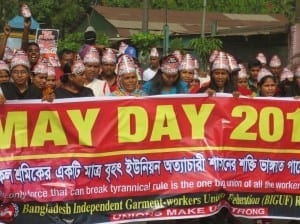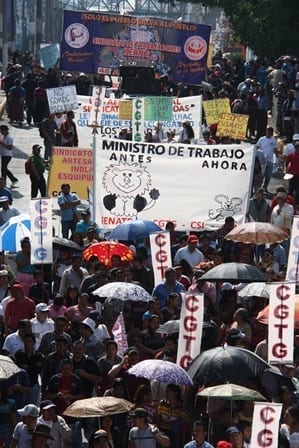May 1, 2014

Members of Bangladesh Independent Garment Workers Federation marching today. Credit: Solidarity Center
More than 100 years ago, workers striking for an eight-hour day and living wages declared May 1 an annual date for international labor rights to honor workers and raise awareness of their struggles.
Around the world, many workers are still fighting for those basic rights. In Bangladesh, garment workers seeking to make their workplaces safe are forming unions, despite sometimes formidable odds, including violent attacks against workers and organizers.
Since last year, after the collapse of Rana Plaza and when garment workers began a serious push to organize and seek official recognition of their unions from the government, more than 100 unions have been registered. In the three years prior, only two unions were allowed to register.
“Now that we have a union, if (wage) payments are delayed, we can find out what the problem
is and work can go on,” said Rumi Akhter, a union leader. Rumi and her co- workers recently formed a union at a Weltex apparel factory in Dhaka, the capital (see video).
he Solidarity Center has been bolstering worker rights defense efforts in Bangladesh—including providing safety and health training, legal support and union building—for years. It recently established an emergency fund to help organizers and worker activists injured or otherwise harmed as they fight for better wages and working conditions. The country is one of dozens where the Solidarity Center assists local unions, worker centers and community groups to empower workers on the job and in civil society.
“In low-wage economies in general, companies find little reason to protect the rights and interests of workers—and corporate self-regulation has proven a faulty tool for ensuring healthy and dignified workplaces,” says Alonzo Suson, Solidarity Center Bangladesh country program director. “Without the relative strength of a union to represent them, vulnerable and impoverished workers cannot fight alone for their rights.”
May Day is a time to celebrate the historic achievements of trade unions. And as the International Trade Union Confederation (ITUC) points out, it is especially a time reaffirm our commitment to organize workers everywhere and support their fights for: freedom of association and collective bargaining; mnimum wages on which workers can live; universal social protection; and safe, healthy and sustainable jobs.
May 17, 2013

Workers rally for justice for murdered trade unionists during May Day events in Guatemala City. Credit: Stephen Wishart
Worker rights groups are urging the Guatemalan government to bring justice to the families of the more than 56 trade union leaders killed in the past three years. No one has ever been convicted in Guatemala for killing a union leader.
The Trade Union Confederation of the Americas (TUCA) has written to President Otto Perez Molina asking for action to resolve the murders of union leaders and for a commitment to guarantee the right to freedom of association and collective bargaining. TUCA, the regional structure of the International Trade Union Confederation (ITUC), represents more than 50 million workers.
In the letter, TUCA states the murders and the numerous acts of torture, kidnappings, raids and death threats have created a culture of fear and violence throughout the country accompanied by an unrelenting series of violations of freedom of association and the right to collective bargaining.
TUCA also writes that the global trade union movement was surprised by the 2013 Report by the International Labor Organization Committee of Experts which cited the government’s progress in resolving numerous cases.
“While progress was reported in these cases, the report fails to share information on concrete results or sentences in a single case. Of most concern is that of the 58 killings admitted by the government over the last six years, only in two cases has the government declared trade union activities as the motive. The other deaths are included among the so-called common crimes such as ‘extortion,’ ‘personal differences’ or ‘crimes of passion.’”
Over the past 20 years, the international community has appealed to the Guatemalan government to address serious human rights violations, to little effect. In addition, Guatemalan unions have sent detailed recommendations for improved labor rights compliance to its government, filed under the Dominican Republic-Central American Free Trade Agreement (DR-CAFTA) complaint process. In 2008, six Guatemalan trade unions filed a complaint about the suppression of worker rights under the trade agreement. The case advanced to the dispute resolution phase in 2011 and is still pending.
TUCA writes that the Rios Montt verdict, “achieved through a profound mobilization of Guatemalan civil society, must now be consolidated, and extended to all sectors of society who suffer the weight decades of violence and impunity. The labor movement, in particular, continues to be one of the main targets of this repression.”


